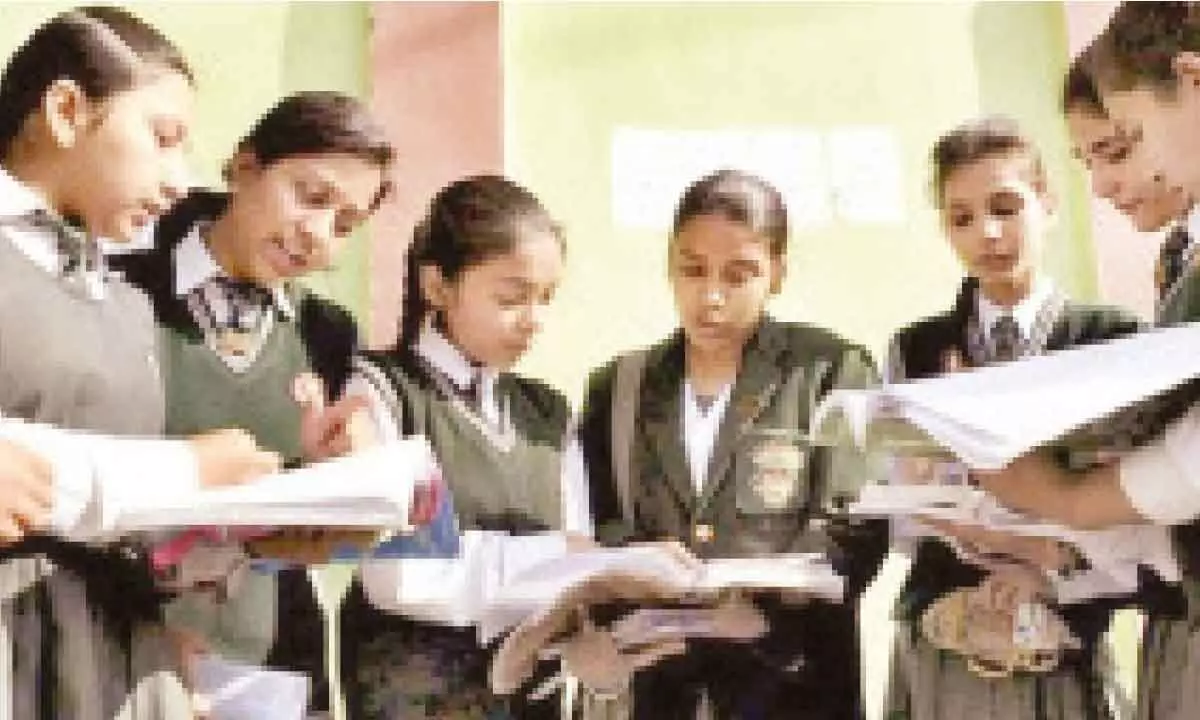Live
- India Faces Blow as Pacer Mohammed Shami Ruled Out for Remainder of Australia Series
- Biden Pardon: Joe Biden Commutes Death Sentences of 37 Inmates, Including Child Killers and Mass Murderers
- South Korea: Yoon believes impeachment trial takes priority over martial law probe
- Strict Action for Non-Adherence to Time Management - DMHO Dr. Swarajya Lakshmi
- Over 13.29 lakh houses approved for rural poor in Maharashtra: Shivraj Chouhan
- District Collector Urges Timely Completion of Indiramma Housing Scheme Survey
- Digital Arrest Scam: Hyderabad Man Duped of ₹7 Lakhs by Fake Crime Branch Police Callers
- Sukhbir Badal seeks President's Police medal for officer who saved his life
- US Firm Accordion Acquires Merilytics, Launches 1,500-Seater Office in Hyderabad
- Free Medical Camp Organized by Alampur Advocate Bar Association
Just In
School Education Saga - XVIII: Telangana funding policies of schools: Well-being vs Welfare


Has the State adopted reasonable discrimination or discriminatory policies?
Hyderabad: Should school funding policies of the state government aim at the well-being of all school-going children? Or, should the welfare policies of some school children mean the well-being of all?
This policy perspective poses a question about the school education department's existence, functioning and objective to look after the education of all children. A trichotomy policy pursuit differentiating children's education raises the rationale of the existing school education policies.
Firstly, the state government's welfare schooling policy launched several schools based on community-based residential welfare schools. Rightly so, to give a thrust to the educational advancement of the children from the disadvantaged classes and communities in about 370-odd Educationally Backward Blocks (EEBs) under the centrally sponsored schemes like Sarva Shiksha Abhiyan (SSA), Rashtriya Madhyamik Siksha Abhiyan (RMSA) and Teacher Education (TE), which are merged now into Samagra Siksha Abhiyan (SSA).
With the change in the definition of 'school', the current scheme treats the pre-school, primary, upper primary, secondary and senior secondary into one. In turn, these interventions helped the construction of additional classrooms, toilets, and Kasturba Gandhi Balika Vidyalayas (KGBVs), extending the benefit of education from pre-schools to Class XII. In addition, Telangana State has established model schools and residential welfare schools in the last ten years, incurring an expenditure ranging from Rs 50,000 to Rs 1.5 lakh per student annually.
The results and learning outcomes of the students do show it is a great success story. Adding to this, it has also caught the attention of within the country and abroad, resulting in a Harvard University team descending in Telangana to take it up as a case study.
Secondly, there are around 26,000 Zilla Parishad Schools (ZPS) and Mandal Praja Parishad Schools (MPPS). These have been providing for the much-needed educational needs for decades from the United Andhra Pradesh till date. However, due to neglect of successive governments and half-hearted initiatives, these schools that have played important roles in the public education system are now facing a tough time to meet recurring expenses due to a shortage of funds.
Funding to these schools is provided based on different pupil bands.
A school with a student strength of 1 to 20 falls under the lowest band. Annually, such schools get Rs. 5,000 towards maintenance grants, Rs. 5,000 towards the school grant and Rs. 5,000 more for meeting other expenses. When the strength of students stands between 20 and 40, the school annually will get a school grant of Rs. 12,500 and a similar amount under the remaining two heads.
Speaking to The Hans India, N Ramakrishna (name changed) of an MPSS school in Bhadrachalam mandal said, “We have to meet expenses of celebrating Independence Day, Republic Day, Telangana State formation day, children's Day, Teachers Day and few other events.” The annual grant of Rs. 15,000 under the three heads is insufficient to celebrate even two events," he added. The Headmasters or teachers will have to bear the expenses like chalk pieces, dusters, and a few other items needed for the daily running of the classes.
The issue of a third category of schoolchildren in the State remained controversial for over a decade. It turned more fierce, post the formation of Telangana, with parents accusing the successive State governments of acting hand-in-glove with the private and corporate schools to fleece parents as they like in the name of school fee loot. Despite several complaints and court battles, the school education department acted to the tune of the powers that be, failing to act against the erring school.
Corporate schools collecting high fees have mushroomed in Hyderabad and its adjacent districts, unlike in the other four metro cities in the country. The State government's assurance to bring a Private Schools Fee Regulation Act has remained a non-starter, while the private corporate fee loot continues academic year after academic year, points out Hyderabad School Parents Association (HSPA), which has been waging a legal battle against the State government for the implementation of the fee regulation act.

© 2024 Hyderabad Media House Limited/The Hans India. All rights reserved. Powered by hocalwire.com






